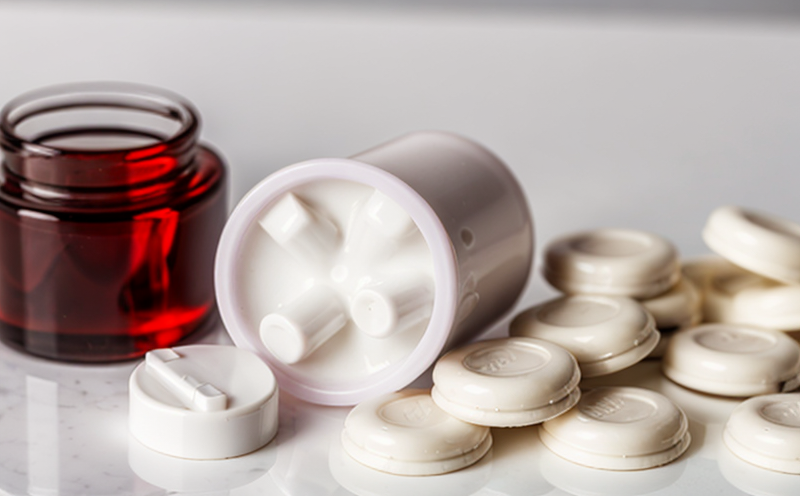USP Tablet Stability Under Humidity Testing
The USP Tablet Stability under Humidity Testing is a critical component of ensuring the quality and efficacy of pharmaceutical products. This test evaluates how well tablet formulations maintain their integrity, stability, and potency over time when exposed to varying humidity levels. The importance of this testing cannot be overstated, especially in environments where tablets are stored or dispensed.
Pharmaceutical companies must comply with stringent regulations set forth by the United States Pharmacopeia (USP) and other regulatory bodies worldwide. These standards ensure that drug products remain safe and effective throughout their shelf life. USP Tablet Stability Under Humidity Testing plays a pivotal role in meeting these requirements, as it provides insights into potential degradation pathways and helps identify any changes that could impact patient safety or product efficacy.
The test is particularly relevant for tablets intended to be taken orally, which often consist of multiple excipients and active pharmaceutical ingredients (APIs). Exposure to humidity can lead to various types of degradation, including:
- Hygroscopic absorption
- Crystalline transformation
- Decomposition reactions
- Melting or softening of excipients
The testing process involves exposing tablets to controlled humidity levels over an extended period. The aim is to simulate real-world storage conditions and predict the stability profile of the product under these conditions. This information is crucial for determining optimal packaging strategies, storage recommendations, and potential shelf life extensions.
Compliance with USP standards ensures that pharmaceutical manufacturers meet not only regulatory requirements but also enhance patient trust in their products. By conducting thorough stability testing, companies can ensure that their tablets remain stable and effective even when exposed to varying environmental conditions.
In addition to ensuring regulatory compliance, conducting this test provides valuable data for R&D teams. This information helps optimize formulation designs, select appropriate excipients, and refine manufacturing processes. The insights gained from these tests are instrumental in improving product quality and extending shelf life, ultimately benefiting both manufacturers and consumers.
Scope and Methodology
| Parameter | Description |
|---|---|
| Humidity Levels | The test involves exposing tablets to humidity levels ranging from 5% to 95%, with a temperature of 25°C ± 2°C. |
| Test Duration | The exposure period is typically set at 18 months, which closely aligns with the USP requirements for stability testing. |
| Sampling Frequency | Samples are taken every three months throughout the test duration to monitor any changes in physical and chemical properties. |
The testing process begins by selecting a representative batch of tablets. These samples are then conditioned according to USP guidelines, ensuring they reach equilibrium with the specified humidity levels before testing commences. The instruments used for this test include humidity chambers that can precisely control and maintain the required environmental conditions.
During the exposure period, critical parameters such as hardness, friability, disintegration time, dissolution rate, color change, weight variation, and moisture content are monitored regularly. These metrics provide a comprehensive picture of how well the tablets withstand humidity-induced changes. The data collected is meticulously documented and analyzed to assess compliance with USP specifications.
At the completion of the 18-month period, detailed reports summarizing the findings are prepared. These reports include all measured parameters along with interpretations based on industry standards such as USP , which outlines specific acceptance criteria for humidity testing. Compliance with these standards ensures that the product meets the necessary quality requirements.
Quality and Reliability Assurance
- Comprehensive Monitoring: Our team employs advanced instrumentation to continuously monitor critical parameters throughout the entire test period.
- Data Integrity: All data points are meticulously recorded, ensuring accurate and reliable results. This approach helps maintain high-quality standards.
The reliability of our testing services is further enhanced by adhering strictly to USP guidelines and leveraging state-of-the-art equipment. Our team of experts ensures that every aspect of the test is conducted with precision, providing clients with confidence in the accuracy and validity of the results.
By choosing us for your USP Tablet Stability Under Humidity Testing needs, you can rest assured knowing that your products will meet regulatory requirements and provide consistent quality to consumers. Our commitment to excellence in every step of the process ensures that your pharmaceutical products are safe, effective, and reliable.
Environmental and Sustainability Contributions
- Eco-Friendly Packaging: We utilize eco-friendly packaging materials for our testing samples to minimize environmental impact.
- Energy Efficiency: Our humidity chambers are designed with energy-efficient features, reducing overall operational costs while minimizing waste.
In addition to ensuring the highest quality of service, we also recognize the importance of sustainability in our operations. By adopting eco-friendly practices and using efficient equipment, we contribute positively to environmental conservation efforts. This commitment aligns with broader industry goals towards greener manufacturing processes.
Our dedication to sustainability extends beyond just reducing our carbon footprint; it includes promoting responsible resource management throughout the pharmaceutical supply chain. By working closely with manufacturers on sustainable practices, we aim to create a more resilient and environmentally conscious sector.





